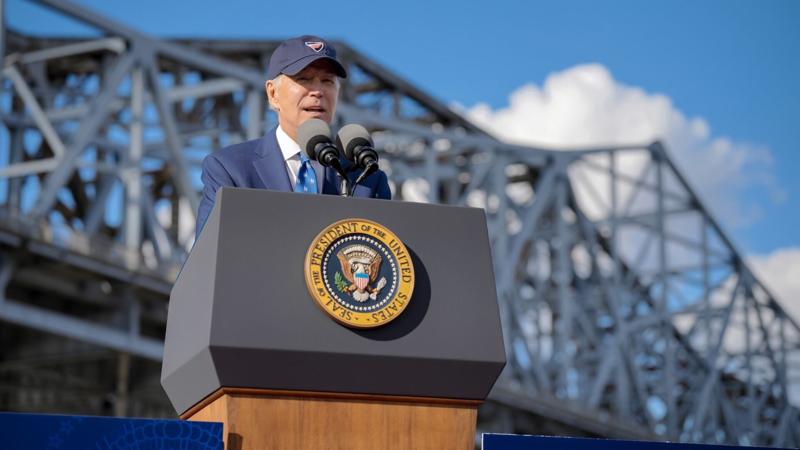President Joe Biden blocked a $14.9 billion buyout of Pittsburgh-based U.S. Steel on Friday.
The move, albeit not surprising after a year of negotiations that left the administration and other critics unswayed, means the Japan-based Nippon Steel’s intended takeover of the iconic American company will not happen without legal intervention.
In a statement, the White House reiterated national security concerns over unfair trade practices that allow foreign producers to flood the market with steel at “artificially low prices,” forcing domestic operations to shutter.
“Today’s action reflects my unflinching commitment to utilize all authorities available to me as president to defend U.S. national security, including by ensuring that American companies continue to play a central role in sectors that are critical for our national security,” he said. “As I have made clear since day one: I will never hesitate to act to protect the security of this nation and its infrastructure as well as the resilience of its supply chains.”
The Center Square requested comment from U.S. Steel; one was not made available before this publication. In September, the company warned that killing the deal could force its headquarters out of Pittsburgh, taking thousands of jobs and more than a century of cultural legacy with it.
President-elect Donald Trump and Pennsylvania’s Senator-elect Dave McCormick have likewise both expressed support for blocking the sale in recent months. The latter reiterated as much during an October debate.
Supporters of the deal, however, have dismissed the president’s concerns as shortsighted. During an interview with CNBC in September, Dartmouth Tuck’s School of Business Dean Matthew Slaughter called Japan one of the nation’s most “stalwart allies” and pointed to existing protections within the law to preserve the “nationality” of the company’s executive board.
As of 2021, Slaughter cited federal data that shows 7.9 million Americans work for U.S. affiliates of foreign multinational companies. Nippon owns 2,000 U.S. patents and supports 4,000 workers at operations in Arkansas, Pennsylvania, Alabama, Virginia and West Virginia.
“These global companies, when they invest in America, they bring technology, they bring global expertise, they bring financial and physical capital, and the data are overwhelmingly clear on what these benefits have brought,” Slaughter said.
The United Steel Workers Union, which represents Nippon’s employees and more than 850,000 others across the country, was never convinced that the company’s acquisition would prevent layoffs in Pennsylvania.
“Nippon has proven itself to be a serial trade cheater that for decades worked to undermine our domestic industry by dumping its products into our market,” said union President David McCall. “Allowing it to purchase U.S. Steel would have offered it the opportunity to further destabilize our trade system from within and in the process, compromise our ability to meet our own national security and critical infrastructure needs.
“It’s clear from U.S. Steel’s recent financial performance that it can easily remain a strong and resilient company,” he continued. “We now call on U.S. Steel’s Board of Directors to take the necessary steps to allow it to further flourish and remain profitable.”
Not all U.S. Steel workers share the same concerns. In September, more than 1,000 employees rallied outside the company’s headquarters in Pittsburgh in support of the acquisition as a last-ditch effort to save their jobs.
Clairton Mayor Richard Lattanzi told KDKA in November that should Mon Valley’s steel mill in the community close, the town would be decimated: 1,000 jobs lost, or roughly 30% of the tax base.
“I’ll be honest with you the city of Clairton, there ain’t no sense being mayor because there ain’t nothing that’s going to get done here,” he said on the Marty Griffin show.
Senate President Pro Tempore Kim Ward, the upper chamber’s highest-ranking Republican, became a leading voice within state government in support of the buyout. For her, the issue is deeply personal: her district envelops U.S Steel’s Mon Valley Works.
In the past, she’s noted that her compassion for the union workers hanging in the balance comes from lived experience. In the 1980s, her father lost his job as the industry slid into decline, forcing the family into “tremendous hardship.”
In November, she wrote a letter to Gov. Josh Shapiro urging him to declare his position on the proposed sale – something he’d been reticent to do despite growing divisions among laborers.
On Friday, Shapiro sidestepped the issue again, noting that he’d been involved in conversations with Nippon and U.S. Steel since the deal was announced in December 2023. Ultimately, as he told The Center Square in November, the decision was not his to make.
“The federal government has the sole authority to approve or block this deal – and throughout the last year, both President Biden and President-elect Trump made clear that they were opposed to it,” he said. “President Biden has now used his authority to block the transaction.”
In his statement, Shapiro went on to say that he expects U.S. Steel will stop “threatening” its workers in Pennsylvania. He also left the door open for other domestically-based buyers.
“This matter is far from over – we must find a long-term solution that protects the future of steelmaking in western Pennsylvania and the workers who built U.S. Steel and built this country,” he said.






